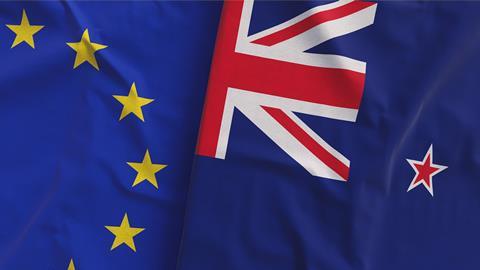Agreement with European trading bloc offers major potential benefits for suppliers of kiwifruit, apples, and onions
Exports of kiwifruit, apples and onions from New Zealand to the EU are expected to benefit immediately from a new free-trade agreement signed on 9 July.
As a result of the deal, which according to NZ prime minister Chris Hipkins will increase New Zealand’s trade with the EU by NZ$1.8bn. duties are immediately removed on 91 per cent of goods shipped from the Pacific nation to the bloc.
That figure will rise to 97 per cent after seven years, it has been reported, resulting in tariff savings of NZ$100m per year.
Trade association Onions NZ described the FTA as “a fantastic outcome” for the country’s onion growers and exporters.
“Once the FTA comes into force, the 9.6 per cent tariff on NZ onions will be removed immediately,” it commented.
“The EU is our number one market for onions. Well done to those involved for negotiating and concluding this FTA during the Covid pandemic.”
A similar FTA between NZ and the UK came into force at the end of May 2023.
The EU represents a major export market for NZ kiwifruit too. According to the NZ Horticulture Export Authority, the value of the country’s kiwifruit exports to the EU in 2022 was €453.6m and around a quarter higher than in 2020.
The volume of those exports was around 220,000 tonnes, a 20 per cent increase in volume from 2020.
The value of its apple exports to the EU in 2022 was €203.4m, 10 per cent up on 2021, for a volume of roughly 160,000 tonnes.
Ursula von der Leyen, president of the European Commission, said: “New Zealand is a key partner for us in the Indo-Pacific region, and this free trade agreement will bring us even closer together. With today’s signature, we have taken an important step in making the agreement a reality.
“This modern free trade agreement brings major opportunities for our companies, our farmers and our consumers, on both sides. With unprecedented social and climate commitments, it drives just and green growth while reinforcing Europe’s economic security”.




